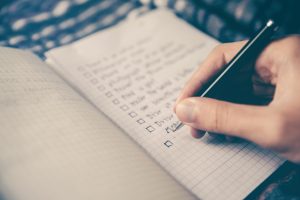Are you looking forward to Christmas or are you dreading it? Some people will be counting down the days in excited anticipation, whilst  others will be wishing it was all over? It can be a particularly difficult time for those people who have lost loved ones or where separation of family members can be highlighted, causing further distress. Christmas is a time for re-igniting many emotional thoughts and feelings for many of us.
others will be wishing it was all over? It can be a particularly difficult time for those people who have lost loved ones or where separation of family members can be highlighted, causing further distress. Christmas is a time for re-igniting many emotional thoughts and feelings for many of us.
I really enjoyed reading this article by a fellow hypnotherapist, Katherine Finn so thought I’d share it with you. In addition, I have put some hints and tips together to help you feel more relaxed, calm and in control during this festive period and to focus on the positives and what’s important……..
Finding Your ‘Happy’ This Christmas
I appreciate that even for those of us who usually look forward to the festive season, 2020 continues to challenge us – requiring us to compromise and adapt our hoped-for plans. But does this mean we are also forced to lower our expectations and restrict our opportunities for creating and sharing the magic of Christmas? I suppose it depends on what ‘Christmas’ means to you.
Perhaps if 2020 does have a silver lining, it’s the opportunity we’ve had to re-evaluate, prioritise, and appreciate the simple things in life – an ‘attitude of gratitude’ for the things and people we can sometimes take for granted. Plus, our constant attempt to focus on what we can influence and our recognition of the benefits in doing just that.
We’ve been asked repeatedly to practise thinking, acting, and interacting in a positive way – despite the pandemic – and what better time to reflect, acknowledge, and celebrate your personal strengths and the qualities that have helped you through this testing time?
Christmas may not be ‘normal’ this year, but perhaps you can utilise your skills to create a different recipe using the ingredients you have to hand. Let’s take back control with our imaginations, our creativity, our sense of humour, and our values – all of which are priceless, yet can be gift-wrapped to share with others at no expense. Small acts of empathy, kindness, and compassion can make a big difference, and they can bridge a physical gap allowing us to reach out and connect with one another. And it doesn’t stop there – there’s often a wonderful ripple effect and you’ll notice a rewarding bounce-back, which, in turn, gives you a lovely boost.
 Solution Focused Hypnotherapy helps you to combat feelings of anxiety, frustration, and low mood and gives you the tools to find your way into the best mindset possible – so that you can cope better, whatever the situation. Solution-focused hypnotherapists work on the premise that “problem talk creates problems, solution talk creates solutions” (Steve de Shazer). Using your imagination to your advantage is therefore key because neurons that fire together wire together and map new neural pathways in your brain for your thoughts, feelings, and behaviour to follow.
Solution Focused Hypnotherapy helps you to combat feelings of anxiety, frustration, and low mood and gives you the tools to find your way into the best mindset possible – so that you can cope better, whatever the situation. Solution-focused hypnotherapists work on the premise that “problem talk creates problems, solution talk creates solutions” (Steve de Shazer). Using your imagination to your advantage is therefore key because neurons that fire together wire together and map new neural pathways in your brain for your thoughts, feelings, and behaviour to follow.
You can start now by putting any frustrations, stresses, or worries gently to one side and instead visualising what you wish for this Christmas – concentrating on what is possible and within your reach. (Written by Katherine Finn)
Hints and Tips for Coping & Enjoying Xmas.
- Keep things in perspective
On the run up to Christmas we often put ourselves under a huge amount of stress, emotional, financial pressure in trying for it being perfect – but try not to expect too much of yourself or others. Remember its one day. - Do one thing at a time
I love a list and it can really h elp you to prepare for Christmas. Work your way through the important ones first crossing them out as you get them done, this is so rewarding. Just getting started can be tricky but then your off.
elp you to prepare for Christmas. Work your way through the important ones first crossing them out as you get them done, this is so rewarding. Just getting started can be tricky but then your off. - Ask for Help – Family including the children and guests can all help towards making your Xmas a good one and involves them , takes the pressure off of you and guests often like to help so let them ! Whether its bringing something , helping prepare,, laying the table, washing up, take the load off of you and enjoy Xmas you deserve as much as them.
- Self Care – Take time out for YOU
Take even 5 – 10 minutes and do something for you not to do with Xmas. Read a book, listen to your favourite song, get your nails done , if you can have more time, treat yourself to a long bath, a massage or watch a good film. - Live in the moment
Don’t dwell on the past or worry about the future it will drain your much needed energy. Easier said than done but focus your mind on the present and what is positive and what you are grateful for. - Talk about your anxieties
Talking with someone about the things that are worrying you can help you to realise that some of them aren’t so important after all. - Don’t have a competitive Christmas
Don’t be sucked in by social media. If you believe social media, everyone else will be enjoying merrier, better decorated, more delicious, better planned Christmas than you, Don’t be fooled. Although it can be fun to swap festive wishes online, a core driver of social media is the instinct to show off and out-do others. Don’t try to keep up, do your own thing and leave them to compete on social media. - Limit alcohol, eat well and keep active
It can be tempting to turn to alcohol to cope with stress, loneliness, but alcohol is a depressant so limit your intake to within safe guidelines and avoid too much sugary food, which can leave us lethargic and feeling low. Eat plenty of vegetables, fruit and lean meat, and drink lots of water in between the occasional festive indulgence. A brisk 20 minute walk will release endorphins, helping you feel relaxed and happy, as well as boosting your immune system, helping you avoid seasonal viruses. - Help others
Helping others or performing small acts of kindness is great for our own mental wellbeing. Consider some festive volunteering, check in on someone living alone mindful of social distancing, maybe take a festive treat to a lonely neighbour, cook them a meal, or even tie a wrapped gingerbread Xmas tree on the door of each house in your street. Try it – you’ll feel good! - Sleep well
Avoid using screens (smartphones, tablets or laptops) before bed as they disrupt our ability to sleep – try reading instead – and don’t sleep with a television on. Avoid coffee, cola and energy drinks for a few hours before sleep; caffeine is a stimulant and can stop us sleeping but recent research shows that it also resets our body-clock, postponing our sleep and subsequent wake times. A dark sleeping space will really help and try to relax before bedtime by listening to my relaxation audio MP3 before you go to sleep each night (If you need a copy just email me and l will send it over) - Breathe
The simplest mental wellbeing trick of all. Whenever you feel stress or anxiety building, concentrate for a minute or so on taking slow, steady, deep breaths, emptying your lungs as much as possible in between each breath. Breathe in for four counts and out for six, in through your nose, out through your mouth.

“HANGXIETY” A few drinks can relax you – but, says scientist David Nutt, that morning-after feeling is the booze playing tricks with your brain
Ever wondered why you feel so awful the day after a few drinks?
It’s not just the headache or the sicky, nauseous feeling, it’s the niggling idea that you did or said something you wish you hadn’t. The worry of the morning after. The hangover anxiety, or ‘hangxiety’ as it is rapidly becoming known.
Well it’s all to do with the effects of alcohol on our GABA receptors. GABA is an amino acid produced in the brain that acts as a calming factor by supressing nervous activity. (That’s gamma-aminobutyric acid, if you want the full name!) Alcohol stimulates the production of GABA, which means that to begin with we feel happy and relaxed as we enjoy those first couple of drinks.
David Nutt, a professor of neuropsychopharmacology at Imperial College London, explains in an article in The Guardian that after those first few drinks, a second relaxing effect takes place. We start to block a transmitter called glutamate, which normally excites the brain and causes anxiety. Therefore, increased GABA levels and decreased glutamate levels form a brain environment that leads to us feeling very chilled out and cheerful
Unfortunately (and I’m sure you know what I’m going to say), there is a problem. The chemicals in the brain are now well and truly out of balance, and the body responds by trying to correct the imbalance. So, it attempts to reduce GABA levels, and up glutamate levels. Then you stop drinking, and once again your levels are out of sync. This time Gaba is very low, and glutamate high, resulting in those unpleasant feelings of anxiety. These feelings often begin when we are asleep, causing us to wake in a state of stress after about four hours or so. Professor Nutt says it then takes a day or two for our neurochemicals to return to normal.
Interestingly, because glutamate is also involved with forming and laying down memories, this process is adversely affected by alcohol. Nutt says, ‘once you’re on to the sixth or seventh drink, the glutamate system is blocked, which is why you can’t remember things.’ And, of course, not remembering what happened the night before also adds to the feeling of anxiety.
So, what does the Professor recommend ? Well its certainly not a hair of the dog! This can potentially lead to a ‘cycle of dependence.’ The obvious solution is to drink less if you want to avoid hangxiety, as well as the other problematic effects of a hangover.
And, if on the odd occasion we do have a few too many ciders or G & T’s it is somewhat comforting to understand what is happening in the brain, and that we can ride it out for a day or so until the balance has been restored! Cheers !
Full article at https://www.theguardian.com/lifeandstyle/2019/jan/27/hangxiety-why-alcohol-gives-you-a-hangover-and-anxiety

Finally, I’d like to wish you all a restful, calm, and healthy Christmas and all the very best for 2021.
Best wishes,
Louise
